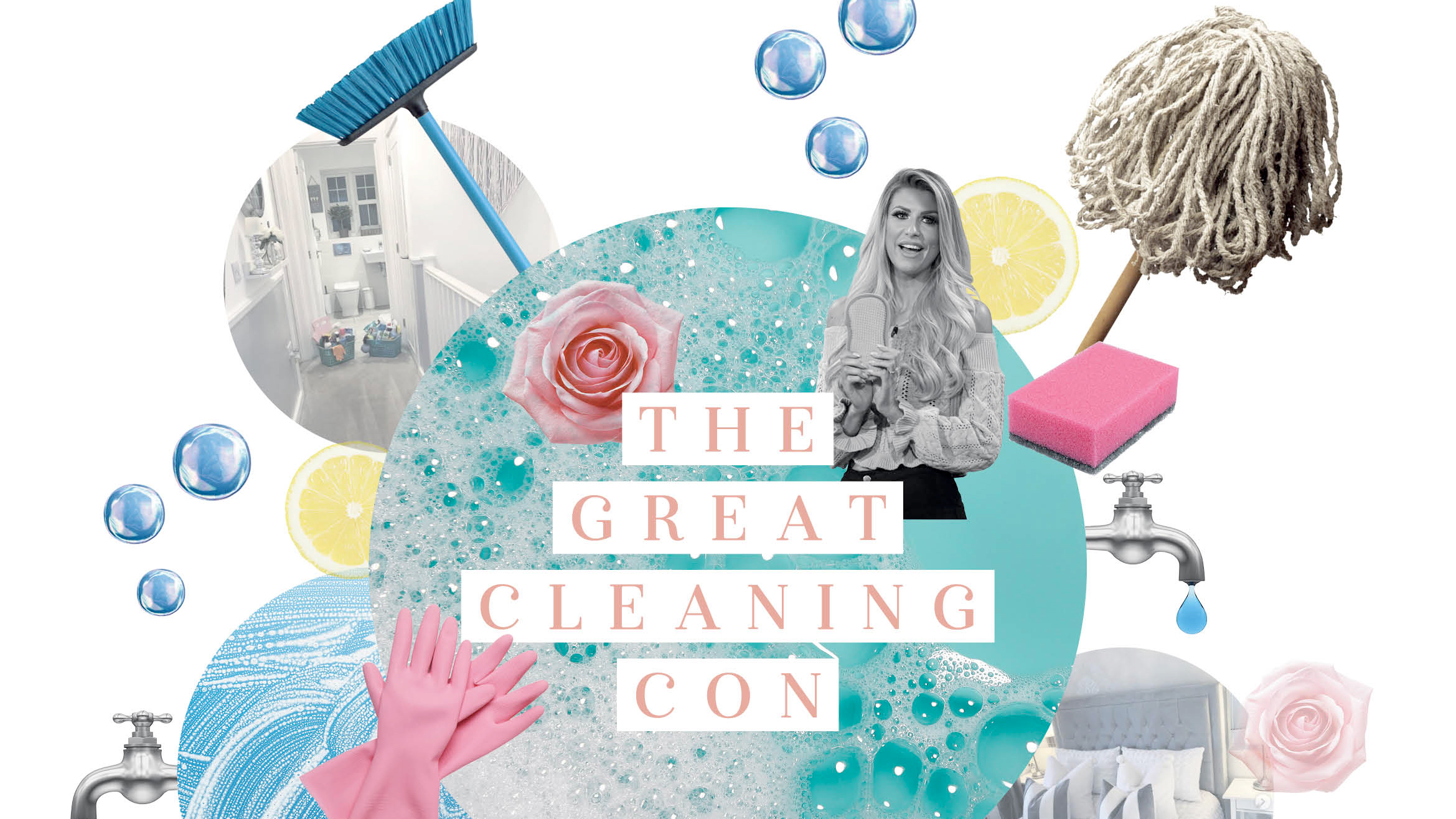Mrs Hinch and the great cleaning con: why women should be worried about the rise of domestic influencers
Thanks to an explosion of domestic influencers on Instagram, housework – once feminism’s public enemy number one – is experiencing a resurgence.

Thanks to an explosion of domestic influencers on Instagram, housework – once feminism’s public enemy number one – is experiencing a resurgence.
Marisa Bate explores Mrs Hinch and the dirty underside of cleaning’s new-gen makeover.
‘You have a room like a slattern!’ my mother would yell into the unclean pit of my teenage bedroom when I was growing up. For her, cleanliness was not necessarily next to godliness, but sat firmly alongside pride and self-respect (while filth was akin to sluttishness). Yet, as I became older, cleaning became a rather more complicated subject for me than just teenage laziness. As I grew increasingly interested in feminism, eventually publishing a book on the subject, I realised housework (and the emotional labour to boot) had hung round women’s necks like a rank political albatross; it had been a shackle that worked to keep men in power, and women out of it. Even today, the slovenliness that I haven’t quite left behind (much to my domesticated boyfriend’s annoyance) is imbued with a quiet, grateful nod to my foremothers, who fought so hard for me to be able to worry more about my career than scrubbing the kitchen sink.
This is why I find it mildly alarming that the biggest influencers of 2019 – the very role models girls and young women are looking up to in their millions – aren’t popstars or politicians, but women who clean. Instead of flashing rock-solid abs or sporting Grenson Nanette boots, they are gaining hundreds of thousands of followers for their spotless front rooms and stain-removal hacks; flogging not handbags, but Marigolds and antibacterial spray (Zoflora is, by all accounts, the Tom Ford Black Orchid of the cleaning world).
Sophie Hinchliffe, 29, a hairdresser from Essex, is leading the charge. More commonly known as Mrs Hinch, her Instagram account has 1.9m followers and, this month, she publishes her first book, Hinch Yourself Happy: All The Best Cleaning Tips To Shine Your Sink And Soothe Your Soul. Ever since she started posting Instagram Stories of herself cleaning, nothing short of a frenzy has followed. On 15 April 2018, she had 1,000 followers. By October of that year, she hit the one million mark. ‘I can’t get my head around the growth,’ she says. ‘I keep thinking, where are they all coming from?’
After Morrisons sold 13,000 Minky pads (a cloth favoured by Mrs Hinch) in five days, the supermarket has rationed them to two per customer. ‘Whether we like it or not,’ says Hinchliffe, ‘we all have to do cleaning at some point in our lives. So, without realising, we’ve all got this thing in common. My Instagram has just brought people together.’
Mrs Hinch is not alone. Nicola Lewis, aka This Girl Can Organise (_thisgirlcanorganise), the ‘queen of decluttering’, has 80,500 Instagram followers, and Queen Of Clean (lynsey_queenofclean) has 111,000. Plus, there’s Marie Kondo, who’s been teaching the world to throw things away if they don’t spark joy since her international bestseller was published in English in 2014. Her Netflix show Tidying Up With Marie Kondo, released in January, revived attention around her and has been watched by millions. Meanwhile, the message of clean and clutter-free living has been in the popular vernacular for a while – from the popularity of minimalist Scandi living and ‘clean eating’, to the increasing rejection of ‘stuff’ in the name of sustainable living. Arguably, the rise of Mrs Hinch has been a long time coming.
Marie Claire Newsletter
Celebrity news, beauty, fashion advice, and fascinating features, delivered straight to your inbox!
Holly Friend, from the trend forecasting agency The Future Laboratory, suggests that the appeal of Mrs Hinch et al is also linked to the current wellness craze. ‘Self-care has become the defining phrase of our generation,’ she says. ‘Taking care of not just ourselves but our homes is fast becoming the next iteration of that.’ And with Instagram as wellness’s most ardent foot soldier, cleaning is becoming aspirational in its own right. Take Gwyneth Paltrow’s wellness mecca, Goop. A quick search on the site throws up a sun-kissed ‘super organic mom’ in her Bel Air home talking about... cleaning. In between pictures of her browsing vinyl and washing kale, she’s promoting a cleaning product. ‘Brands are undergoing a major change in visual identity,’ says Friend. ‘While products are typically designed for a life below the sink, companies are experimenting to encourage customers to display them proudly. In turn, attractive bottles that resemble wellness or beauty trinkets make ideal content for Instagram, perhaps even more so than the spotless interiors.’
‘Instagram is providing a glossy filter for the unpaid labour of women’
For many, there’s also something more fundamental about housework. ‘It helps us find our way through a dirty world,’ a defender of Mrs Hinch wrote in The Guardian earlier this year. ‘While the country is falling apart around us, with Brexit, austerity anguish and climate meltdown, we need to turn to bleaching our toilets.’ Cleaning to block out a disordered world makes sense in times of political turmoil, but it can also create order in our personal worlds, too. Shahroo Izadi, behavioural change specialist and author of The Kindness Method: Changing Habits For Good, points to the mindful qualities of cleaning. In fact, the tools involved are the same as those Izadi uses in her work with people who have substance abuse issues. ‘Cleaning gives you something to focus on, repetition, being able to do things in your own time and the sense of satisfaction of completing a small task,’ she says. ‘But it shouldn’t become a coping strategy to avoid uncomfortable thoughts.’ Izadi is also concerned that the Insta-cleaning culture could become another way to beat ourselves up. ‘In the same way that we might think, “If I’m not controlling my body, I’m not good enough”, we don’t want that to become, “My house isn’t clean enough, so I’m not good enough.”’
Aside from the role housework plays in our emotional well-being, the feminist in me can’t ignore what this might say about women’s progress today. Although Mrs Hinch is making a lucrative career out of her passion, celebrating cleaning feels at odds with the fundamental fight of the feminist movement that still rolls on, directly impacting the gender pay gap. For decades, domestic labour has kept women in the home, and out of the workforce and positions of power – what Betty Friedan famously called ‘the problem that has no name’. By the 70s, Italian Marxist feminist Mariarosa Dalla Costa began the International Wages for Housework campaign that spread globally. This was, in part, a reaction to the 50s, when advertising helped put women firmly back in the kitchen after a brief period of independence during WWII. A smiling red-lipped woman, kitchen appliance in hand, became the face of a booming post-war economy and the return to a woman’s ‘proper’ place. Arguably, Instagram is providing a similar glossy filter for the unpaid labour of women, simultaneously offering a platform for others to profit from traditional feminised spheres, such as fashion and beauty, and once again, housework.
It’s problematic, right? Journalist Suzanne Moore thinks so. She believes the trend ‘is about taking back control of small private spaces at a time when we need to fight for more in the big public ones,’ she says. ‘I’m quite shocked to see younger women going for it. What next? Mangles and washboards? It’s impossible to understand now how much things like washing machines changed women’s lives.’
Feminist activist and former leader of the Women’s Equality Party, Sophie Walker goes one step further, suggesting that the deliberate design to put women back in the domestic sphere is connected to our current political landscape. ‘There’s a nationalist populist move across various countries right now, which has the protection of men’s jobs and the re-establishment of women inside the home at its core,’ she says. Walker points to US President Donald Trump’s efforts to repeal reproductive rights, Hungarian Prime Minister Viktor Orbán promising women who have four or more babies that they’ll never pay income tax again, and hardline Brexiteer Jacob Rees-Mogg admitting he’s never changed any of his six children’s nappies.
Scarlett Curtis, author of Feminists Don’t Wear Pink, sees the issue differently. ‘There are many more fights that need to be won against patriarchy before we start complaining that we’re the only ones loading the dishwasher,’ she says. ‘Mrs Hinch and Marie Kondo have turned this shameful, unfeminist chore into an activity – by no means a feminist act in itself – however, it’s a way to celebrate and highlight the fact that women do a fuck of a lot of cleaning, and might as well enjoy it and talk about it.’ Unsurprisingly, Hinchliffe herself rejects the notion that cleaning has anything to do with gender at all. ‘My husband loves to do it. I don’t see it as a male or female thing. My followers are all ages and genders, from all over the world. When we put on our rubber gloves, we’re all the same.’
What is clear, though, is that cleaning is imbued with layers of politics, culture and socialisation. For me, domestic labour will always be far more than arguing over who unloads the dishwasher, but a belief in who should have access to power.
The leading destination for fashion, beauty, shopping and finger-on-the-pulse views on the latest issues. Marie Claire's travel content helps you delight in discovering new destinations around the globe, offering a unique – and sometimes unchartered – travel experience. From new hotel openings to the destinations tipped to take over our travel calendars, this iconic name has it covered.
-
 How the slogan t-shirt became this season's must-have - and why it's more than just another trend
How the slogan t-shirt became this season's must-have - and why it's more than just another trendNot just another Nineties throwback
By Clementina Jackson
-
 How are Trump’s tariffs affecting the fashion industry?
How are Trump’s tariffs affecting the fashion industry?The fluctuating situation in the US is having very real consequences
By Rebecca Jane Hill
-
 Here's every character returning for You season 5 - and what it might mean for Joe Goldberg's ending
Here's every character returning for You season 5 - and what it might mean for Joe Goldberg's endingBy Iris Goldsztajn